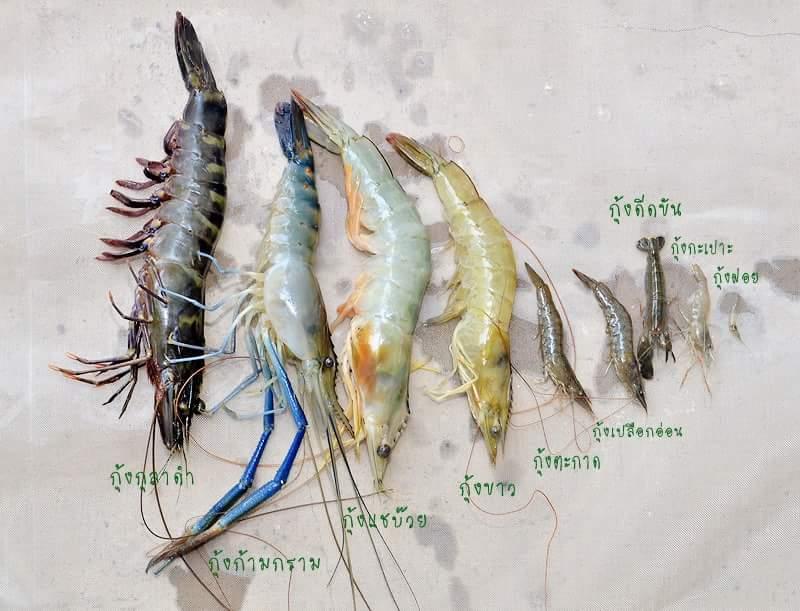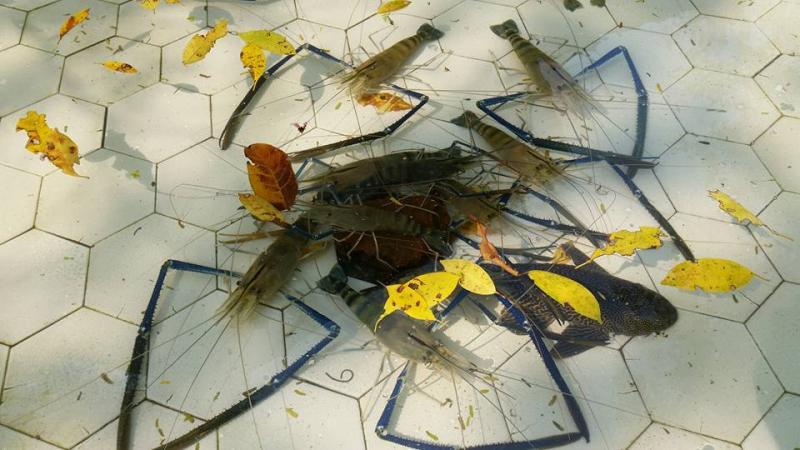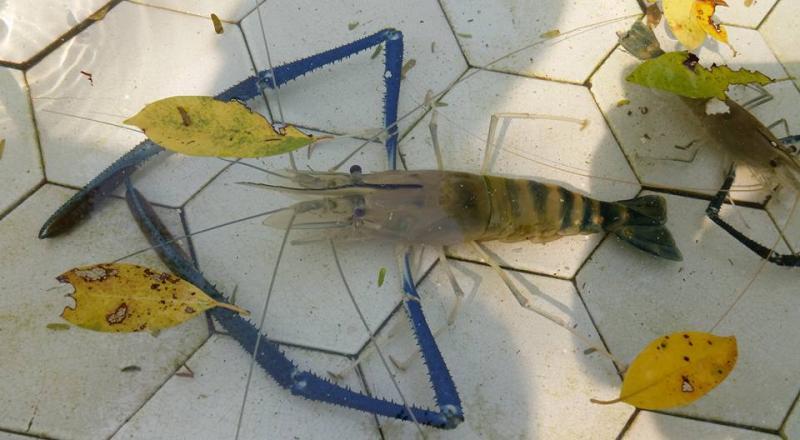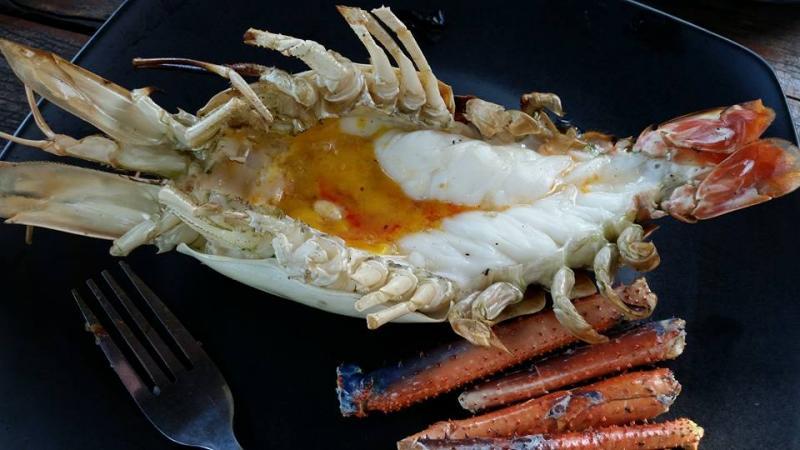-
Posts
1,715 -
Joined
-
Last visited
Content Type
Profiles
Forums
Downloads
Posts posted by Mole
-
-
Well, as a native Thai, I certainly would not used any of your suggestions. They're not even gramatically correct and you'd sound like a goofy farang by saying that.
In Thai culture, we don't ask "what is the most delicious dish you've got?" because you'll most likely get the reply that "everything is delicious here", because saying otherwise would imply that the other dishes are not delicious and they would of course lose face.
-
อาหารจานเด็ด "ahan chan det" is the word used for any house specialty dishes.
As suggested by others here, one can also ask มีอาหารแนะนำอะไรบ้างครับ.
-
กุ้งกุลาดำ กุ้งก้ามกราม กุ้งแชบ๊วย กุ้งขาว กุ้งตะกาด กุ้งเปลือกอ่อน กุ้งดีดขัน กุ้งกะเปาะ กุ้งฝอย
kung kula dam - kung kam kram - kung chae buay - kung khao - kung takat - kung pluak on - kung dit khan - kung kapo - kung foi
Somebody posted this on facebook today about prawns which can be found in Bang Pakong river.
Wild prawns from nature aren't actually that rare. For example in Ayutthaya area, the kung kam kram which the area is famous for are all captured from the wild and delivered to the restaurants. They're quite pricey though.
Pics are some I recently had when I was in Ayutthaya.
-
Sure, แล้วหรือยัง is correct and used all the time. But not แล้วยัง.
หรือยัง when said fast can sound like ลึอยัง or ละยัง making some people with untrained ears think they heard แล้วยัง being said.
-
And no, if you will start trying to explain that perhaps the Isan people have the habit of saying "แล้วยัง" because they say "แล้วบ่อ", nope. There's no way for them to mix up "หรือยัง" and "แล้วบ่อ".
-
Actually, the only instance where "แล้ว" is said is when that Isan dude is saying "กินขาวแล้วบ่อ". But that doesn't mean "แล้วยัง" but if one would translate to equivalent standard Thai it would be "แล้วหรือไม่".
-
The irony itself is that the video that he posted himself to prove that he is right, actually proves quite conclusively that he is wrong!
Ask any Thai what they're really saying in that video!
-
I've been travelling a lot lately, so haven't been around here this much.
But for the word.
What they are saying in this video is "กินข้าวหรือยัง" but said fast, it may sound like "กินข้าวละยัง".
Ask any native Thai and anyone will tell you it's หรือ and not แล้ว. It's only a farang who thinks you're hearing "แล้ว".
There is no such thing as "แล้วยัง".
I find it quite surreal that I, as a native Thai, when I try to tell you how the correct usage, but get corrected by some farang who thinks he knows better, but the problem is that he is WRONG, and it's simple as that! This moron still stubbornly refuse to acnowledge this.
In additional, you dare to to question my proficiency in Thai, a language I've spoken my entire life... what the??
-
Of all major car rental companies
https://www.thairentacar.com/index.php/en/
This offers the best rates.
Also good rates, but not as good as above.
All the others such as avis, budget, etc, offer much higher rates.
-
I never buy their combo tickets. When you arrive at the airport, as long as it's before 4PM, you can just buy the transfer yourself at the counters at the airport.
This way, you'll have the flexibility for example of flying with AirAsia and going with fast Lomprayah catamaran. There's also thai lion air, with very competitive prices.
Often some flights may not show up if you chose their combo tickets to Samui. Also, you actually pay MORE when you buy combo tickets through the airlines than if you buy at the airport counter. Don't worry, there is always space on the boats.
Just make sure you arrive before 16:00, because after this time, there won't be any buses going to the pier, and you'll be forced to hire a airport limo for 1600 to the pier. Look more info here:
-
Regarding "เปิดแล้วหรือยัง" and "เปิดแล้วยัง", we would not say เปิดแล้วยัง but say เปิดหรือยัง but when spoken it usually would soud like เปิดละยัง, which to you farangs may appear to sound like "เปิดแล้วยัง".
I suggest you have a Thai write it down to you, and you will see they will automatically write as หรือ.
เปิดแล้วหรือยัง can be used if for example you've been waiting a long time already for them to open, so you're kinda like asking if they're gonna open already?
Adding แล้ว would be emphasizing on that word.
Think of the example as กินข้าวแล้วหรือยัง and กินข้าวหรือยัง and กินข้าวยัง all 3 examples is correct, but กินข้าวแล้วยัง is not.One can also remove ข้าว so it would be กินแล้วหรือยัง or กินหรือยัง or กินยัง as shortest form. But กินแล้วยัง is wrong!
When we say กินข้าวหรือยัง it may sound like กินข้าวละยัง which for the untrained may sound like กินข้าวแล้วยัง but it's not.One hear it quite often people simply say ไปยัง, มายัง or ไปเปล่า, มาเปล่า which is just a short form of ไปหรือยัง, มาหรือยัง or ไปหรือเปล่า, มาหรือเปล่า
When spoken it can sound like ไปละยัง, มาละยัง or ไปละป่าว, มาละป่าว.
They're not saying ไปแล้วยัง, มาแล้วยัง or ไปแล้วเปล่า, มาแล้วเปล่า
There are only หรือยัง and หรือเปล่า never แล้วยัง and แล้วเปล่า
Look it up in the dic!
-
NO NO NO!
We NEVER say กินข้าวแล้วยัง!!!
It's กินข้าวหรือยัง you moron!!
You've been hearing it wrong and thought you've heard แล้ว when it's actually หรือ.
ASK A THAI!!! And anyone will confirm what I've told you!!
What a stubborn idiot!
I'm telling you, seriously! There is NO SUCH THING AS แล้วยัง in Thai!
Do some freaking research on your own!
-
Like the other thread where you failed spectacularly, this is also same.
Please just ask any Thai native about the meaning of it, and you'll see that they'll say the same as me.
There is really no ambiguity at all. It's exactly what I told it was.
It's an ironic statement.
You are still just trying to nitpick on insignificant details in a pathetic attempt to justify that you were right. Just stop it please and silently leave with your tail between your legs as usual again. -
Tissue paper:
คลีเน็กซ์ from Kleenex (yes, Thai people also use this)
Adhesive tape:
สก๊อตเทป from Scotch Tape
Adhesive cleaning pad:
สก๊อตไบร์ท from Scotch Brite
Chicken Chili sauce:
น้ําจิ้มแม่ประนอม from the Mae Pranom brand of chicken chili sauce
Colored marker pen:
สีเมจิก from Magic MarkerSanitary pad:
โกเต๊กซ์ from Kotex
Chocolate malt:
โอวัลติน from Ovaltine
Probiotic drink:
ยาคูลท์ from YakultOther's which has already been mentioned here
Instant noodles:
มาม่า from Mama brand
Washing powder (both for hand and machine, only used for powder detergent, for liquid detergent, people just call it น้ํายาซักผ้า):
แฟ้บ from Fab by Colgate.
Although "Fab" is not availble in Thailand anymore, people still keep using the word "แฟ้บ".
Photocopy:
ซีร็อกซ์ from Xerox
(Still quite commonly used and readidly understood)
Diapers:
แพมเพิส from Pampers
Bleach:
ไฮเตอร์ from Haiter by Kao
Shampoo:
แฟซ่า from Feather by Kao
Diswhasing liquid:
ซันไลต์ from Sunlight by Unilever -
Just don't use เปิดไหม, it's not correct.
เปิดแล้วหรือ is also not quite correct. It means more like asking "Are you open already?" Besides, although it's gramatically correct to write หรือ, it would be considered old fashioned to say หรือ. People nowadays say เหรอ instead. เหรอ actually started off as a slang of หรือ but has now become an accepted alternative way to write เหรอ. It's always pronounced as เหลอ.
หรือ becomes เหรอ only at the end of sentences. It's still written as หรือ when it's not at the end, such as หรือยัง or หรือเปล่า
-
You're merely hearing รึอยัง said and you think you hear แล้วยัง. Because people don't say หรือ but in another tone รื้อ which is the same tone as แล้ว.
Often when spoken fast, it may even sound like ละยัง เลอะยัง etc. But trust me, it's หรือยัง.
I suggest you ask your friend exactly what they're saying, or have them write it down to you and you will see that they'll write หรือยัง.
Trust me man, it's not even slang, I talk slang all the time. I am native Thai...
-
To get things straight again, แล้วยัง is incorrect no matter context or circumstances. PERIOD!
When to use ไหม or หรือยัง and the different meaning of these 2 words, think about this for example:
กินข้าวไหม and กินข้าวหรือยัง
Do you see the different meaning in those 2 examples?
That's the same with เปิดไหม and เปิดหรือยัง
เปิดไหม means: "Would you like to open?"
while เปิดหรือยัง means: "Are you open yet?"
So in any context, one use หรือยัง to ask if something has happened yet. แล้วยัง is just wrong.
-
Tahnil, it was you who erroneosly suggested "แล้วยัง" and all this BS snowballed from here and all other people who you said also suggested "แล้วยัง" are also foreigners who appears to be just following your original erroneos suggestion.
So, I merely came along to get things straight. The reason why I'm alone in saying so is probably I'm the only native Thai in here. I suggest you go and check with some native Thai, such as your girlfriend, boyfriend, or something in between, then you can silently leave the room with the tail between your legs...
It's actually quite unfortunate that this thread has snowballed so far with the erroneos แล้วยัง.
People who probably won't be bothered to read through it all will only read the few first posts and thinks that แล้วยัง may be correct.
I also did read through the BS written in here, and was hoping that somebody surely would quickly come along and correct or at least suggest หรือยัง, but to my surprise and horror, nobody has yet. I'm starting to wonder of the level of proficiency of you people in here now...
We Thais don't say "แล้วยัง" but it's "หรือยัง". Often when spoken, it may sound like รื้อ or รึอ.
Often we even just skip the หรือ and simply say เปิดยัง, มายัง, กินข้าวยัง, but this require that we are already a bit acquainted with the person we speaks to, for example when talking to a neighbor or relative, or friend.
It's also OK if we say "เปิดยังครับ" to complete strangers. By adding ครับ at the end makes it more polite, so even though we skipped "หรือ" it's still perfectly understood.
To be really really polite, one can also say it fully "เปิดหรือยังครับ", but this would usually be said in a very formal setting, for example asking somebody at the bank or something like that.
-
Well, this surely escelated out of porportions....
"Mr Teacher" is at it again, and wrong again...
No Thai would say "เปิดแล้วยัง". It's just wrong. We NEVER say like that to ask if a place is open or not.
We say "เปิดหรือยัง" which means "open or not (yet)".
Ask any Thai about this.
Actually, we never say "แล้วยัง".
In every instance that Tahnil use "แล้วยัง", Thai people use "หรือยัง".
ปิดหรือยัง
กินข้าวหรือยัง
มาหรือยัง (Yes, we don't say มาแล้วยัง but มาหรือยัง)
แล้วยัง is just wrong!
Forgot to mention that even though it's gramatically correct to write หรือ but when we say it, it's colloquially pronounced with different tone as รื้อ. (Similar situation as เขา (they), which is pronounced as เค้า)
-
It is actually quite common way to write like this. For example people also write just "วะ" when they actually mean "หวะ".
It's not the word "ว้า" she is trying to write, but "หว่า". Different tone!! You've totally misunderstood everything and still subbornly instist that you are correct.. what the???
By context, the meaning of the entire conversation is exactly what I told it was. It's just you who haven't understood it.
The way you are trying to analyze it by either splitting it up as ไม่สวยหรอกน้อง ใครว่า or ไม่สวยหรอก น้องใครว่า shows you have totally missed the full context.
The fact that you initially wasn't even sure if it's a "she" or "he" when the word สวย was used shows your Thai isn't as good as you really think it is...
-
You know, my opinion as a native Thai, (if that counts anything..)
That wasn't probably not even about you.
The meaning is something like:
Nobody can force my heart to "stop loving" any person..
Also, I must not "forget" to remind myself that I also won't be able to "force somebody's heart" to love me too.
Trust me, she's just tricking you for your money. Her heart is with somebody else entirely and she's frustrated that that other person she loves doesn't love her back.
-
It's a chat, so spellings aren't gonna be quite 100% correct, but it is obvious what's written here:
A: ไม่สวยหรอกน้องใครว่า [ไม่สวยหรอก น้องใคร(ห)ว่า]
means something like
She's ugly! (said ironic as a joke, it is of course understood that she's actually quite pretty) I wonder who's younger sister's she is?The way the sentence is written, it wouldn't even actually quite make sense if it was the word "ว่า" to mean "speak or say". The word "บอก" would have been used instead.
B: น้องเธอไง
She's your sister, of course!
A: จ้า
Of course!
So, the meaning of this entire conversation can be understood as somebody showing the picture of a younger sister of "A" and "A" just says "Who's younger sister is this pretty girl?", "Yours of course"
"Exactly!"
So in other words, "A" is like complimenting that her sister is as pretty as she is.
FYI, I'm a native Thai speaker and the meaning of this conversation is quite obvious to us. Try asking your wife/girlfriends of it and you'll see they agree with me.
Also, when I read through Tahnil's attempts, it's obvious he needs more training in his Thai. The mere fact that the word สวย is used, shows that we are talking about a girl, and not a boy, in which case the word หล่อ would have been used. -
Fortunately, there are lots of other more interesting things to do on Ko Tao. If you haven't mentioned about this place, it would have probably faded into obscurity, so thanks for reminding.
-
There are several exchangers who gives slightly better rates than banks. But unless you plan to exchange a lot of money, the difference isn't gonna be really that much, so you might as well just go to nearest bank.
.png.3b3332cc2256ad0edbc2fe9404feeef0.png)






How to ask what is the House Special/Best Dish in a Restaurant?
in Thai Language
Posted
"Kho thot krap. Ahan chan det a-rai krap?"
Yes, you can say that. "chan det" means exactly "house special" or "best dish".
See meaning of เด็ด in this dictionary entry.
http://dict.longdo.com/search/%E0%B9%80%E0%B8%94%E0%B9%87%E0%B8%94
Note that there is a distinction how to ask this question. One ask either what their recommendation is, or what their "chan det" is, and not what is the most "delicious".
You can for example google อาหารจานเด็ด and find lots of suggestions.